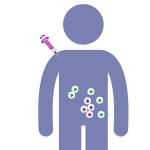Recent work by Kjersti Flatmark’s team in Oslo, Norway has shown some exciting developments in our understanding of the genetic mutations that can result in people who develop pseudomyxoma peritonei ( or PMP)¹. The GNAS gene controls the switch for cell survival and growth. Mutations in the GNAS gene result in a faulty switch that leads to uncontrolled production of mucin and may drive disease progression in those with PMP.

A pilot study to test the safety of this approach is being planned in Oslo and may lead the way to trials in patients with recurrent PMP who have the GNAS gene mutation who are not suitable for surgery. This would be a form of immunotherapy and would be a significant step forward in our understanding and treatment of PMP.
Faheez Mohamed, MD, MBChB, FRCS
Peritoneal Malignancy Institute, Basingstoke
¹Flatmark K, Torgunrud A, Fleten KG, et al. Peptide vaccine targeting mutated GNAS: a potential novel treatment for pseudomyxoma peritonei. Journal for ImmunoTherapy of Cancer 2021;9:e003109. doi: 10.1136/jitc-2021-003109

I think it’s excellent that you and your team are pioneering research into improved prognosis for PMP.
How long does it take for these trials to materialize and will Basingstoke also partake in trails for their patients?
I guess what I’m asking is how do we innovate faster so people don’t slip through the net and miss an opportunity for cure (if this works).
Thank you for posting this information here on this website, Mr Mohamed.
I have just been informed of a recurrence and surgery is not possible, I do hope that this may help others who find themselves in this situation in the future.
Does anyone know if/when this might be available? The study seemed successful according to the papers, how do we make this available to patients with PMP? I’m in the UK and always worry about recurrence, I imagine I’m not alone.
After reading the paper shared by the great Mr Mohammed I feel a solution is ready but not yet clinically available.
I am researching T-Cell treatment abroad as well in case I need to travel.
It would be so good to know if this is available and if not why not?
Thanking you again so much, just need a little more tangible hope for us all.
Please could you tell me how someone could take in these trials? My husband has been diagnosed with PMP and is not suitable for surgery so we are looking for any ray of light possible to help him.
Thank you
Hi Amanda
Was your husband deemed unsuitable for surgery through scans or exploratory laparoscopy? If you don’t mind me asking have you got a second opinion?
I’ve tried to reach out to the Professor who published the research mentioned in this article but without reply. There are some organizations that specialise in immunotherapy based on genetic sequencing -have you spoken to any?
Hi Eli, apologies for the late response, I’ve only just seen it. My husband had some debulking surgery last year but they said there was too much to take out any more, which then meant he was not eligible for the HIPEC treatment. He is currently having chemo to see if they can get rid of some of the high grade to open up options. I think he had a blood test to see if he was eligible for immunotherapy and they said he wasn’t. Any advice you could give would be great, if you can recommend any organisations to contact for second opinions.
Have you managed to get your under control?
Thanks
Amanda
I am very interested in this study as having genome testing done (I hope). My PMP is present on lungs and inoperable. Am in Australia under Prof Morris.
It will probably some time before this becomes a clinical treatment.
I sent the paper to my surgical oncologist in the US; we’ll see what, if anything he says.
I am encouraged by how quickly the mRNA vaccines for Covid were able to be developed; perhaps this vaccine could be produced by the same mechanism, and granted emergency use authorization?
I was advised that the vaccine is in production and will not be available for trial Until at least 2023 and at that time will involve a small Norwegian sample of patients only.
Hi Tara – following a recent presentation by the Oslo team, I can confirm that they believe the trial won’t commence now until 2024.
I don’t get it, why do they boast so much confidence in their studies and even go as far as trademarking the proposed drug’s name but can’t even get to a trial before 2024?
How frustrating
Hi Amanda,
My husband was also diagnosed with PMP 3 years ago and was not eligible for HIPEC neither. We have heard about Dr. Morris treatment in Australia and so far that is the only promising treatment available. However, we have been waiting to hear back from Dr. Morris and FDA approval. We know we are praying for a miracle.
Any update about this. Maybe someone contacted the Norwegian hospital?
The team in Oslo are currently raising funds to move the trial further forward. Pseudomyxoma Survivor are investigating ways in which can assist. All fundraising activities welcome.
Hi P – we are now live with fundraising to support this trial. More information on this link: https://www.gofundme.com/f/pmp-mutated-gnas-vaccine-project
Hi have had the cyctoreductive surgey with HIPEC however it came back but it isn’t the same and cant be surgically removed. Would I be an option for the trial?
Hi Samantha – the trial won’t be starting till at least 2023 and our understanding is that the initial pool of patients will be from Norway.
Hi Susan, thank you for sharing the fundraising page to support this trial.
It might be a good idea to have a separate post promoting the fundraising objectives and how the funds will go to improve the current pace of things (as I understand the team in Norway have already raised multiple rounds).
The hypothesis for the treatment is very promising news however, I feel somewhat disheartened by the lack of reactivity -after all we are talking about a cure for cancer here backed by paid research that shows strong efficacy in potentially curing PMP. It’s unlike any new treatment option we’ve ever seen for patients with PMP, its such a huge breakthrough that it surprises me it needs spearheading.
If this is a funding issue caused by £50k (which I highly doubt) then it can easily be filled but given the potential of this drug I believe it should be followed, have regular updates posted to the community with a contact/link to Norway that can answer questions.
Has anyone found any particular diet and/or supplements to help slow tumour growth? I feel like I have had some success with soy milk (some studies investigate the use of genistein to suppress MUC2 production). Also I take some flax oil after reading about the Budwig diet for cancer, and try to avoid saturated fat.
Hi Kate, It’s so refreshing to hear someone bring up diet & nutrition. I feel like nutritionists, chemists and surgeons don’t interact enough.
I too have read about genistein, flaxseeds & ginseng root having nutritional benefits for PMP patients and include most in my wife’s diet. My wife started doing intermittent fasting which has had a profound impact on her recovery (post 6 months HIPEC) -there are tons of studies on the benefits of fasting.
She was due to start HRT but so far we’ve waited until our HRT clinic can confirm there are no risks. PMP is so rare and there is little research about the impact of HRT on patients -for example you mentioned MUC2, not only is this a molecular marker for pseudomyxoma but its also present in ER+ Breast cancer which is treated by reducing estrogen.
Hopefully more research and progress can be made to guide and improve the lives of everyone touched by PMP.